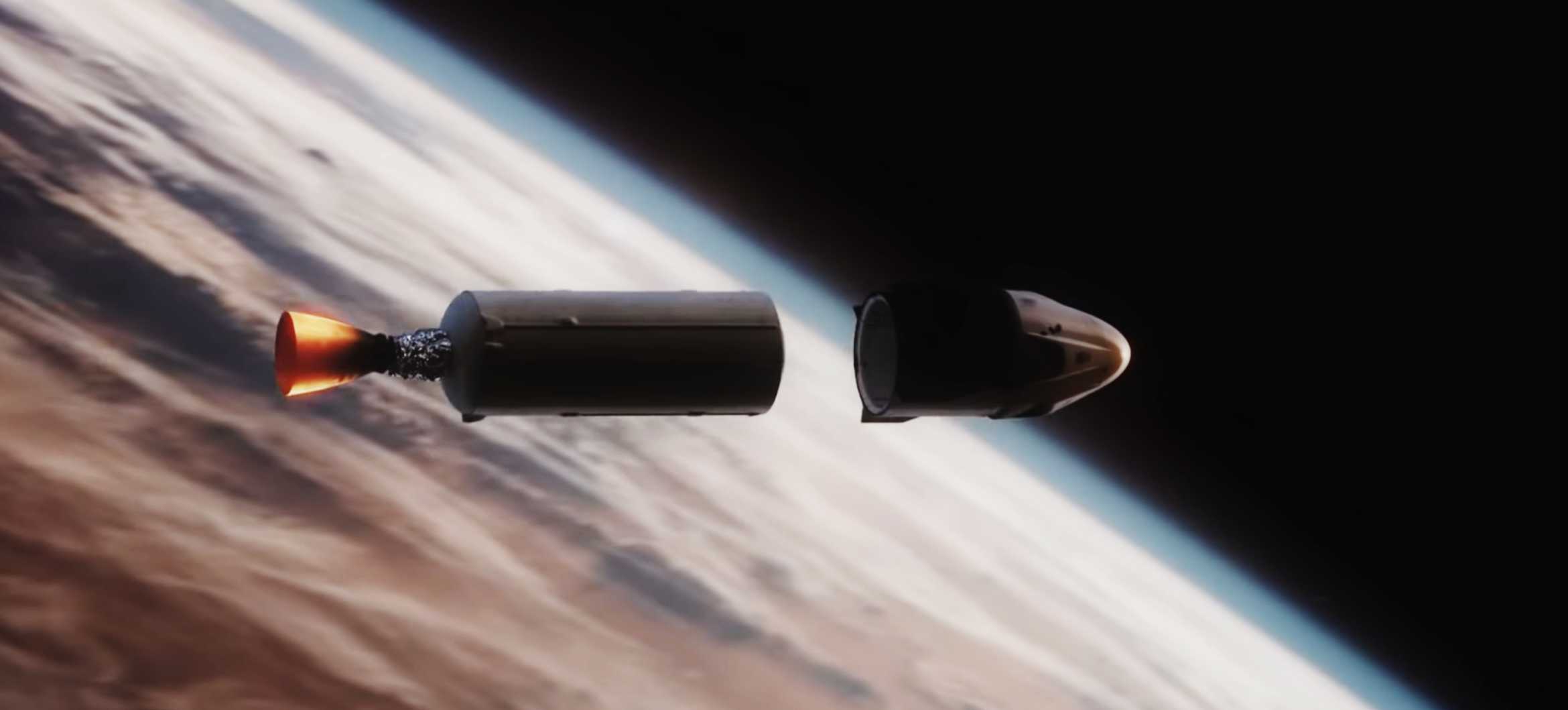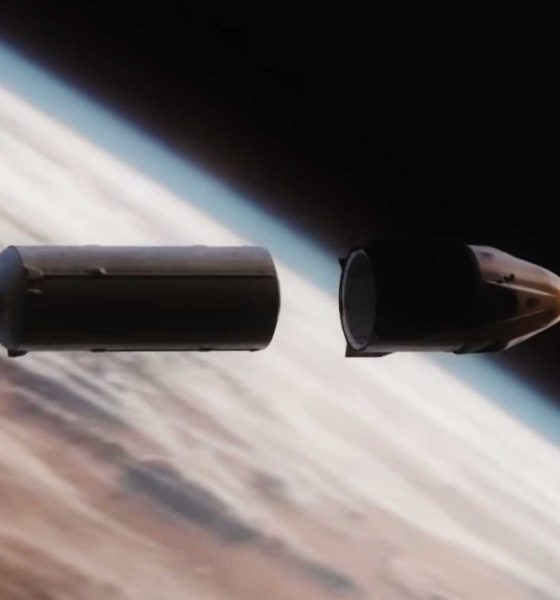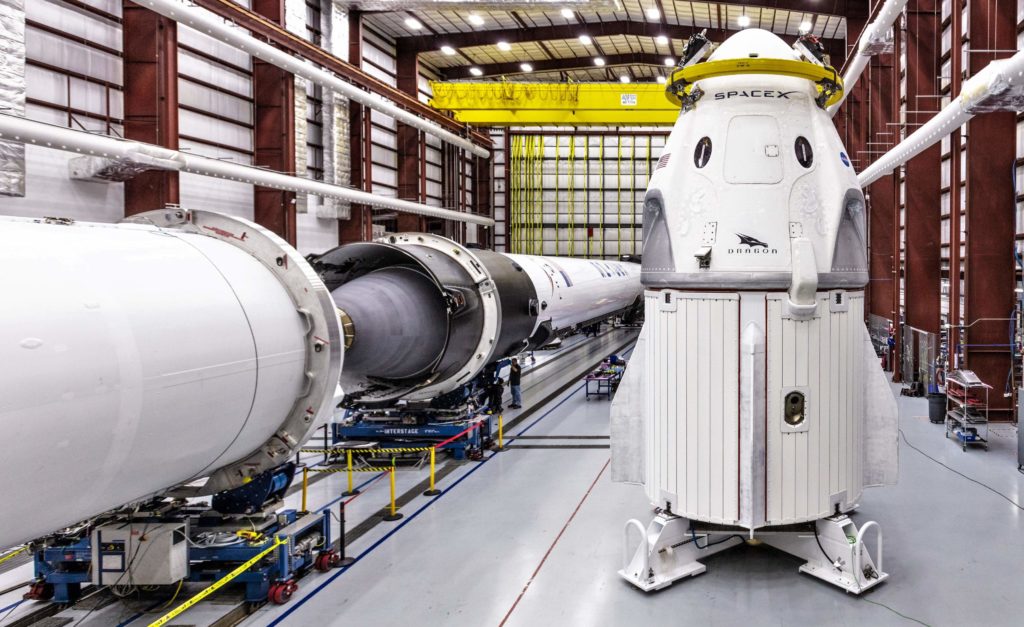

News
SpaceX rapidly tests, ships Falcon 9 second stage for next NASA astronaut launch
SpaceX has shipped, tested, and delivered the new Falcon 9 upper stage tasked with carrying the company’s next Crew Dragon astronauts to orbit as early as October 30th.
Offering rare insight into the kind of timelines and margins SpaceX operates on for even its most important missions, a Falcon upper stage bearing NASA’s ‘worm’ logo and ‘meatball’ insignia was spotted by a local resident and photographer on October 2nd. Thus far, the only SpaceX rockets that have flown with NASA iconography are those supporting Crew Dragon launches, making them a dead giveaway for Crew Dragon launch hardware.
After Demo-2, SpaceX’s May 2020 astronaut launch debut, the company moved those decals from Falcon 9’s booster – liable to fly any number of non-NASA missions later in life – to each NASA crew mission’s expendable Falcon second stage (S2). Since then, Crew-1 (November 2020) and Crew-2 (April 2021) have both launched with NASA logos on their second stages and Crew-3 now looks set to continue that tradition.
Thanks to the watchful eye of local resident turned SpaceX fan Reagan Beck, it was actually possible to identify Crew-3’s Falcon 9 upper stage as soon as it was spotted at the company’s McGregor, TX development and testing facilities on October 2nd. While there was technically a tiny chance that it could be for one of several upcoming NASA spacecraft launches or even for Crew Dragon’s April 2022 Crew-4 mission, the likeliest destination by far for the NASA-branded Falcon S2 was Crew-3.
Due partially to the fact that Falcon booster qualification testing typically takes McGregor at least two or so weeks but mainly to the seemingly razor-thin schedule margins it would imply, there was some understandable skepticism that the upper stage was bound to launch Crew-3 just four weeks after it was first spotted. Moreso, Crew Dragon typically rolls out to the launch pad on Falcon 9 at least 5-7 days before launch to allow extra time for an integrated static fire, final checkouts, and a ‘dry dress’ practice runs for each mission’s crew.
Further, even after completing static fire qualification testing in McGregor, Crew-3’s Falcon stage would still need to be packaged up, transported more than a thousand miles by road, carefully unpackaged at a SpaceX launch site or hangar, outfitted with a Merlin Vacuum nozzle extension, installed on the mission’s Falcon 9 booster, and mated to Crew Dragon itself before that pad rollout can occur. In other words, rather than Crew-3’s exact October 30th launch date, the mission’s upper stage would likely need to arrive at SpaceX’s Kennedy Space Center (KSC) Pad 39A launch facilities at least 9-10 days before launch.
Realistically, that means that from the moment the NASA-branded upper stage first spotted on a McGregor test stand, it had maybe two weeks to complete qualification testing and ship out to Pad 39A. With practically no context, that seemed like a stretch at the time – particularly for a single-engine Falcon second stage explicitly tasked with safely delivering four astronauts to orbit. In reality, McGregor’s Falcon S2 testing is apparently far faster than booster testing and the presumed Crew-3 stage seemingly passed qualification testing and vacated the test stand less than five days after it was installed.
In theory, that left the McGregor team about a week to complete post-test inspections, clean the interior of its propellant tanks, and prepare the stage for the last leg of its journey to Florida. SpaceX seemingly managed that without issue and a new Falcon upper stage potentially meant for Crew-3 was spotted in Florida just a few miles away from a SpaceX launch site on October 14th.
However, per additional photos and reports from Reagan, McGregor’s second stage test team has been incredibly busy over the last month or so. Prior to the Crew-3 stage’s arrival, another second stage completed qualification testing between September 21st and 28th. Crew-3’s S2 was installed on October 2nd and removed by the 7th. Wasting no time, another second stage was installed on the same stand on October 10th and apparently completed testing by the 13th – equivalent to a new upper stage qualified every week. Even if the Falcon stage that arrived at Cape Canaveral on October 14th isn’t Crew-3’s, then, Crew-3’s can’t be far behind.

Ultimately, SpaceX appears to be testing and shipping one of two integral Falcon 9 stages for a crucial, schedule-sensitive NASA astronaut launch with schedule margins measured in hours or single-digit days. That’s a far cry from competitors Arianespace and ULA and even NASA itself, which generally deliver flight hardware months in advance. Eleven years since Falcon 9’s launch debut, every Falcon second stage that has made it through stage separation – 127 of 127 – has successfully ignited its Merlin Vacuum engine one or several times and delivered its payload(s) to the correct orbit(s). Well over half of those successful launches were completed in the last three and a half years – and with the same Falcon 9 upper stage variant now routinely tasked with carrying astronauts to orbit.
In other words, delivering a NASA Crew mission’s Falcon second stage less than two weeks before the assembled rocket is scheduled to roll out to the launch pad may seem a tad reckless, it’s more likely that it’s evidence of SpaceX’s second stage build/test teams and facilities operating as an incredibly reliable, well-oiled machine.

News
Tesla ships out update that brings massive change to two big features
“This change only updates the name of certain features and text in your vehicle,” the company wrote in Release Notes for the update, “and does not change the way your features behave.”

Tesla has shipped out an update for its vehicles that was caused specifically by a California lawsuit that threatened the company’s ability to sell cars because of how it named its driver assistance suite.
Tesla shipped out Software Update 2026.2.9 starting last week; we received it already, and it only brings a few minor changes, mostly related to how things are referenced.
“This change only updates the name of certain features and text in your vehicle,” the company wrote in Release Notes for the update, “and does not change the way your features behave.”
The following changes came to Tesla vehicles in the update:
- Navigate on Autopilot has now been renamed to Navigate on Autosteer
- FSD Computer has been renamed to AI Computer
Tesla faced a 30-day sales suspension in California after the state’s Department of Motor Vehicles stated the company had to come into compliance regarding the marketing of its automated driving features.
The agency confirmed on February 18 that it had taken a “corrective action” to resolve the issue. That corrective action was renaming certain parts of its ADAS.
Tesla discontinued its standalone Autopilot offering in January and ramped up the marketing of Full Self-Driving Supervised. Tesla had said on X that the issue with naming “was a ‘consumer protection’ order about the use of the term ‘Autopilot’ in a case where not one single customer came forward to say there’s a problem.”
This was a “consumer protection” order about the use of the term “Autopilot” in a case where not one single customer came forward to say there’s a problem.
Sales in California will continue uninterrupted.
— Tesla North America (@tesla_na) December 17, 2025
It is now compliant with the wishes of the California DMV, and we’re all dealing with it now.
This was the first primary dispute over the terminology of Full Self-Driving, but it has undergone some scrutiny at the federal level, as some government officials have claimed the suite has “deceptive” names. Previous Transportation Secretary Pete Buttigieg was one of those federal-level employees who had an issue with the names “Autopilot” and “Full Self-Driving.”
Tesla sued the California DMV over the ruling last week.
News
Tesla workers push back against Giga Berlin unionization
“IG Metall did not succeed in Giga Berlin‘s works council election earlier today. The union share was reduced from nearly 40% in 2024 to 31% in 2026! This is a clear message by the Giga Berlin team towards an independent co-determination! The list called Giga United, led by the current chairwoman, Michaela Schmitz, received the most votes with more than 40%! Good news for Giga Berlin!”

Tesla workers pushed back against unionization efforts at Gigafactory Berlin, and over the past few years, there has been a dramatic decrease in interest to unionize at the German plant.
Gigafactory Berlin Plant Manager André Thierig announced on Wednesday that IG Metall, the European union group, saw its share reduce from 40 to 31 percent in 2026 as employees eligible to vote on the issue. Instead, the Giga Berlin team, known as Giga United, received the most votes with more than 40 percent.
BREAKING! 🚨
IG Metall did not succeed in Giga Berlin‘s works council election earlier today. The union share was reduced from nearly 40% in 2024 to 31% in 2026!
This is a clear message by theGiga Berlin team towards an independent co-determination!
The list called Giga…
— André Thierig (@AndrThie) March 4, 2026
Thierig gave specific details in a post on X:
“IG Metall did not succeed in Giga Berlin‘s works council election earlier today. The union share was reduced from nearly 40% in 2024 to 31% in 2026! This is a clear message by the Giga Berlin team towards an independent co-determination! The list called Giga United, led by the current chairwoman, Michaela Schmitz, received the most votes with more than 40%! Good news for Giga Berlin!”
There were over 10,700 total employees who were eligible to vote, with 87 percent of them turning out to cast what they wanted. There were three key outcomes: Giga United, IG Metall, and other notable groups, with the most popular being the Polish Initiative.
The 37-seat council remains dominated by non-unionized representatives, preserving Giga Berlin as Germany’s only major auto plant without a collective bargaining agreement.
Thierig and Tesla framed the outcome as employee support for an “independent, flexible, and unbureaucratic” future, enabling acceleration on projects like potential expansions or new models. IG Metall expressed disappointment, accusing management of intimidation tactics and an “unfair” campaign.
The first election of this nature happened back in 2022. In 2024, IG Metall emerged as the largest single faction with 39.4 percent, but non-union lists coalesced for a majority.
But this year was different. There was some extra tension at Giga Berlin this year, as just two weeks ago, an IG Metall rep was accused by Tesla of secretly recording a council meeting. The group countersued for defamation.
Tesla Giga Berlin plant manager faces defamation probe after IG Metall union complaint
This result from the 2026 vote reinforced Tesla’s model of direct employee-management alignment over traditional German union structures, amid ongoing debates about working conditions. IG Metall views it as a setback but continues advocacy. Tesla sees it as validation of its approach in a competitive EV market.
This outcome may influence future labor dynamics at Giga Berlin, including any revival of expansion plans or product lines, which Musk has talked about recently.
News
SpaceX President Gwynne Shotwell details xAI power pledge at White House event
The commitment was announced during an event with United States President Donald Trump.

SpaceX President Gwynne Shotwell stated that xAI will develop 1.2 gigawatts of power at its Memphis-area AI supercomputer site as part of the White House’s new “Ratepayer Protection Pledge.”
The commitment was announced during an event with United States President Donald Trump.
During the White House event, Shotwell stated that xAI’s AI data center near Memphis would include a major energy installation designed to support the facility’s power needs.
“As you know, xAI builds huge supercomputers and data centers and we build them fast. Currently, we’re building one on the Tennessee-Mississippi state line. As part of today’s commitment, we will take extensive additional steps to continue to reduce the costs of electricity for our neighbors…
“xAI will therefore commit to develop 1.2 GW of power as our supercomputer’s primary power source. That will be for every additional data center as well. We will expand what is already the largest global Megapack power installation in the world,” Shotwell said.
She added that the system would provide significant backup power capacity.
“The installation will provide enough backup power to power the city of Memphis, and more than sufficient energy to power the town of Southaven, Mississippi where the data center resides. We will build new substations and invest in electrical infrastructure to provide stability to the area’s grid.”
Shotwell also noted that xAI will be supporting the area’s water supply as well.
“We haven’t talked about it yet, but this is actually quite important. We will build state-of-the-art water recycling plants that will protect approximately 4.7 billion gallons of water from the Memphis aquifer each year. And we will employ thousands of American workers from around the city of Memphis on both sides of the TN-MS border,” she noted.
The Ratepayer Protection Pledge was introduced as part of the federal government’s effort to address concerns about rising electricity costs tied to large AI data centers, as noted in an Insider report. Under the agreement, companies developing major AI infrastructure projects committed to covering their own power generation needs and avoiding additional costs for local ratepayers.








